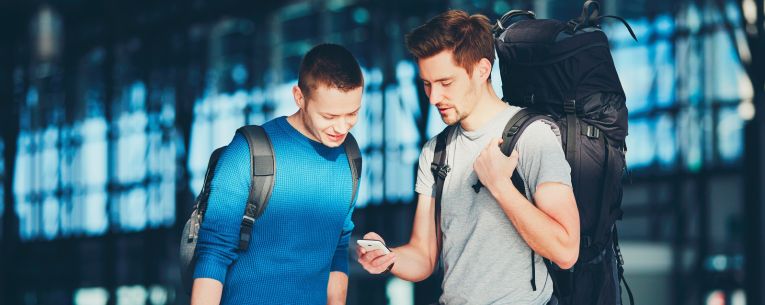Traveling to a country where you don’t speak the language is a major fear for many travelers. They worry that locals will be unfriendly, or they won’t be able to navigate, or they’ll fall victim to a scam.
If you feel nervous about not speaking the language when traveling, know that you’re not alone! A study by Promova found that 1 in 3 Americans usually feel anxious about not being able to communicate while traveling abroad. Interestingly, this attitude is more common among younger travelers; more than half of Gen Z travelers felt language-barrier anxiety, compared to just 23% of Boomers.1
Don’t let this stop you from traveling internationally. With a little preparation, modern translation technology, and the help of these tips from Allianz Travel Insurance, you’ll have no problem communicating with people around the world.
1. Practice saying a few key phrases well.
You probably know the essential phrases for any traveler to learn:
- Hello, good morning, good evening
- Please
- Thank you
- How are you?
- I’m sorry, excuse me
- How much does this cost?
- Where is the bathroom?
Some travelers, however, don’t make much of an effort to learn the pronunciation. As a result, they say things like “Merci beau cul” (“Thanks, nice butt”) when they mean “Merci beaucoup” (“Thanks very much”). At best, a native speaker will laugh; at worst, you could seriously offend. Practice with a language program or pronunciation guide to make sure you’ll be understood.
2. Download a high-quality translation app.
Language translation apps have gotten so good, they virtually erase the language barrier when traveling. The best-known is Google Translate, which is free. Google Translate includes the power to translate between more than 100 languages while typing and 70 languages in audio conversations. No internet connection? The app can still handle text translation for 59 languages.
There are other really good translation app options as well. DeepL is an AI-powered translator known for highly accurate translations of 30+ languages. It can translate your voice into text and vice versa, and also translate full documents. iTranslate translates between more than 100 languages, plus offline voice translation for 4. This app also includes learning tools like bookmarked translations and verb conjugations.
3. Get the Allyz® app for rapid access to 24-hour assistance.
In high-stakes situations, a translation app doesn’t always cut it. If you need urgent help communicating in another language while traveling, contact 24-hour assistance via the Allyz® app. Our expert assistance team can provide live interpretation services if you need to communicate with medical providers, pharmacists, law enforcement, etc.
Allyz® is a top-rated travel app that lets you manage your Allianz travel protection plan on the go and get exclusive access to digital services to help you during your trip. It also can translate common medical terms and point you to the nearest high-quality medical facility.
4. Carry a card with emergency/medical information translated into the local language.
If you have a chronic medical condition or any special needs, it’s a good idea to learn how to explain it. For emergencies, carry a printed card that names your condition in the local language and has some simple language you can point to when you need it. For instance:
- I have Type 1 diabetes. I need sugar immediately—candy, juice, or soda. Please call a doctor.
- I have a life-threatening nut allergy and cannot eat any food with nuts or nut oils. Is this food safe for me to eat?
- I have asthma and I cannot breathe. Please call an ambulance.
Some companies sell these medical information cards for travel, or you can simply translate and print one yourself. It’s also a good idea to include an emergency contact name and number, as well as your travel insurance policy number and the phone number for Allianz Travel Insurance.
5. Learn how to say “How do you say that?”
- ¿Cómo se dice ... ?
- Comment dit-on…?
- Zhège zhōngwén zěnme shuō?
In any language, this simple phrase both helps you learn and shows people you’re trying! It’s also a great way to learn the local vocabulary and idioms. In Latin America, for instance, the meaning of certain Spanish words varies between countries. In Peru, patas means “friends”; elsewhere, it means “feet.” In the Dominican Republic, guagua is a bus; in Chile, it’s a baby. And while pisto means “money” in Central America, in México it’s used to mean alcoholic drinks.2
6. Get an old-school language phrasebook.
If you’re traveling somewhere remote, where phone connectivity isn’t guaranteed and you may not be able to charge your phone, a phrasebook can come in handy. This is just a pocket-sized book with the most useful and common expressions in a given language. Phrasebooks are helpful study guides for language learners, and they can also be a fun read, with bits of slang and cultural information.
7. Learn a few polite compliments.
“The meal was delicious.” “Your city is beautiful.” “You are so kind.”
Saying positive things in the local language is a great way to break the ice and establish a friendly relationship with people when you’re traveling. Just make sure you’re using the right words and respecting cultural norms.
8. Study body language.
When you don’t know the language, it’s natural to resort to expressions and gestures. But these aren’t universal! In the United States, a wide smile indicates friendliness and goodwill. In the Middle East, smiling is used in close relationships, less so among strangers.3 Greeting gestures are different all over the world, from a cheek kiss in France, to a light handshake in China, to a deep bow in Japan.4
9. Manners matter.
Shouting English at people who don’t understand it. Getting frustrated when people don’t speak your language. Using a translation app to get your needs met without bothering to say “Hello,” “please,” or “thank you.” Saying rude things in English and assuming people won’t understand you.
These common tourist behaviors are a sure-fire way to make local people dislike you. No matter where you are in the world, treat people with respect. That’s the best way to make meaningful human connections—and isn’t that the whole point of traveling?
Remember to give yourself grace, too. Locals don’t expect you to speak their language fluently—you’re a visitor, after all! Just do your best, and remember Allianz Travel Insurance is there to help. Traveling soon? Get a quote.
Related Articles








Share this Page